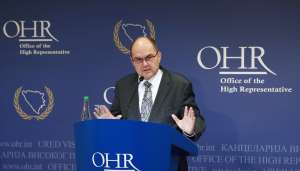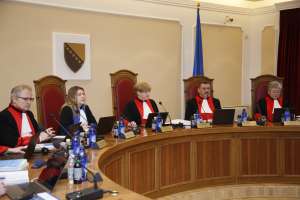LJUBLJANA / SARAJEVO, October 5 (FENA) - Member of the Presidency of Bosnia and Herzegovina Šefik Džaferović, addressing the European People's Party (EPP) conference in Ljubljana, thanked President Donald Tusk for everything he does for Bosnia and Herzegovina, for leadership in protection values of the free world.
“If we are talking about the geopolitical ambitions of the EU, then the first and most important test is the Western Balkans,” said Džaferović.
Some local actors hope, he says, that the erosion of the current order could open space for great "changes", which is primarily manifested in dangerous territorial pretensions.
“The principle of immutability of borders is a cornerstone of European peace and security. Two years ago, Chancellor Merkel's leadership action prevented the dangerous idea of exchanging territories, which would have opened Pandora's box. The famous non-paper also showed that territorial aspirations are still alive. It is encouraging that the international community has unanimously condemned the ideas of non-paper, identifying them as a threat to peace and the international order. But it is worrying that some local actors, even in Bosnia and Herzegovina, have dared to openly support non-paper ideas. And they still continue to promote them, using increasingly aggressive secessionist rhetoric. They threaten European peace and defy international law, encouraged by the crisis of the global order. This phenomenon is so dangerous that one must not be silent about it. Because peace is in question,” said Džaferović.
If the European Union wants to be a geopolitical entity, then it must first address these processes that threaten peace in its immediate neighborhood. Resolute action in one's own backyard is a key condition for global credibility, said a member of the BiH Presidency.
The main reason for the increase in tensions and instability in the region is the crisis of the European perspective.
The reason for that crisis, Džaferović further stated, is the increasingly frequent voices from some European Union countries, which dispute the idea of enlargement, and the concrete confirmation of that mood is the current blockade of the Republic of North Macedonia and Albania. After the spirit of compromise, which symbolized the Prespa Agreement, was played out, the spirit of exclusivity in the region was strengthened.
Recently, an official from Bosnia and Herzegovina, at a political forum in a European capital, stated that Bosnia and Herzegovina will never get a chance to become a member of the European Union. And then, in line with his nationalist agenda, he lashed out at the liberal values of the European Union.
Bosnia and Herzegovina supports the Common Regional Market, within the Berlin Process, we support regional economic and other cooperation, but nothing can be a substitute for the prospect of EU membership.
“I do not want to make things better: the current situation in Bosnia and Herzegovina is dangerous and worrying. State institutions have not been functioning for several months because officials from the Republika Srpska entity refuse to attend sessions. They claim that the reason for that is Inzko's law, but that is not true,” said Šefik Džaferović.
Explaining that the Law prohibiting the glorification of war criminals and the denial of crimes is a civilizational and European law, he adds that in the directives of the European Union, as well as the judgments of the European Court of Human Rights, it is clearly stated that the denial of crimes and the glorification of criminals is not freedom of speech but hate speech.
“Inzko's law is not the reason for the current blockades in Bosnia and Herzegovina. It is just an occasion and an excuse. Republika Srpska politicians also carried out blockades months before Inzko's law. They have been pursuing them for years, finding various excuses and reasons. Yesterday, these were decisions of the Constitutional Court that they did not like; today Inzko's law or the election of a new High Representative; something else tomorrow. And the real reason and goal is always the same: to block the work of the state, create the idea that it is impossible and seek its disbandment, in accordance with the secessionist agenda which is not about peace and progress, but about some goals from past centuries,” said Dzaferovic.
Any state whose top officials would not attend the sessions would not be able to function. It is not the fault of the state, but those officials. The only difference between European countries and Bosnia and Herzegovina is that there is no domestic mechanism for sanctioning such blockades.
The Dayton system envisages that the High Representative will be an instance that will determine the responsibility of officials who obstruct the work of institutions, and thus the implementation of the Dayton Agreement.
“The Office of the High Representative is not a precedent but a necessary occurrence in societies where there have been serious violations of international law. In Germany and Austria, after World War II, there was an Allied Control Council that had significantly greater powers than the OHR, and passed laws, including those on which war criminals were prosecuted. This did not prevent these countries from becoming members of the European Union and the countries that serve as an example today. On the contrary, that Control Council was abolished after the unification of Germany. This should be a signpost for Bosnia and Herzegovina. At the moment when internal cohesion and functionality are achieved, Bosnia and Herzegovina will be able and will have to function independently,” he concluded.
He stressed that building a functioning state is the biggest challenge for Bosnia and Herzegovina. In that sense, one of the key initiatives is the one for the implementation of the judgments of the European Court of Human Rights in Strasbourg, as one of the 14 priorities from the Opinion of the European Commission.
The biggest frustration, Džaferović added, is not in the feeling of underrepresentation of the constituent peoples, but in the feeling of helplessness of the majority of citizens before the fact that ethnic caucuses in parliament can block the adoption of any law, even those that have nothing to do with national identity or by some specific question concerning the constituent peoples.
Specifically, in the House of Peoples of the Federation, an ethnic caucus has been blocking the election of a new government and the appointment of judges in the Constitutional Court for three years.
“It is impossible to talk about the frustrations of any constituent people if we do not solve the stated frustration of all citizens. It is impossible to talk about a compromise solution without taking into account the demands of all actors. It is pointless to demand the fulfillment of the demands of one political party, and to ignore all the others. Compromise is the only solution. Everything else is a dead end,” concluded the member of the Presidency of BiH.
The Western Balkans need the European Union, but the EU also needs the Western Balkans. Any postponement of enlargement indefinitely or challenging the idea of enlargement - can only lead to destabilization, stagnation in reforms and an increase in the influence of other forces in this area. That is certainly not in the interest of the citizens of the Western Balkans or the citizens of the EU, said Šefik Džaferović in his address at the conference of the European People's Party in Ljubljana.
(FENA) A. B.











